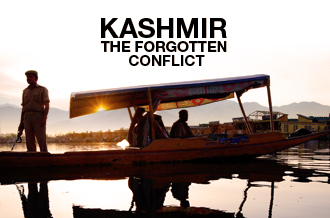Profiles: Armed groups
Profiles of the main armed groups operating in and around Kashmir.

 |
| Armed groups operating in Kashmir have reduced dramatically over the past decade [EPA] |
| Hizbul Mujahideen |
Formed in 1989, Hizbul Mujahideen is considered the largest guerrilla organisation active in Indian-administered Kashmir.
It is also considered to be the only militant group led by and composed of mostly ethnic Kashmiris from Indian-administered Kashmir.
The group, based in the capital of Pakistan-administered Kashmir, is at its core pro-Pakistan. Until 1997, Hizbul Mujahideen maintained ideological and organisational links with the religiously conservative movement Jamaat-e-Islami, also considered to be its parent political party. But Jamaat-e-Islami publicly distanced itself from Hizbul Mujahideen in November 1997.
Hizbul Mujahideen emerged as one of the splinter movements pushing for accession to Pakistan in the early 1990s. They suggested that the issue was based on religion and the only solution would mean joining Pakistan, undermining the Jammu Kashmir Liberation Front’s (JKLF) goal of creating an independent Kashmir.
In many ways, the organisation is credited with bringing an Islamic ideology to the dynamic. Believing him to be either in northern Punjab or Pakistan-administered Kashmir, the Indian government has pressed the Pakistani authorities to extradite the group’s current leader, Syed Salahudeen.
| Lashkar-e-Taiba |
Formed in the mid-1990s, the Lashkar-e-Taiba (Army of the Righteous) insurgent group, made up of mostly radically religious Pakistanis, is said to have been born out of an ultra-orthodox version of Sunni Islam.
|
Current Lashkar-e-Taiba (LeT) leader Hafiz Muhammad Saeed was an academic who turned towards fundamentalist activism in the early 1990s.
Saeed is wanted both by India and the United Nations as a terrorist leader. Despite these allegations, Saeed maintains that he has no connection to the LeT and is instead the head of Jama’at-ud-Da’wah, which he considers a charitable organisation.
LeT have claimed responsibility for most of the daring guerrilla attacks in Indian-administered Kashmir since 1999 and the group was banned in Pakistan in 2002.
Most notably, the LeT was said to have trained 10 of the gunmen involved in the November 2008 attacks in Mumbai.
The LeT has said that militant forms of jihad are “absolutely obligatory” both in self-defence and in response to what they believe to be injustice or oppression towards Muslims the world over. However, in practice, Lashkar’s theatre of operations has been largely confined to Indian-administered Kashmir.
| Harkat-ul-Mujahideen |
A splinter group from the Harkat-ul-Jihad-al-Islami, the Harkat-ul-Mujahideen is a Pakistan-based militant group that, under its former name, Harkat ul-Ansar, was declared a terrorist organisation with ties to Osama bin Laden and al-Qaeda as far back as 1997.
The group’s largest training camp in Mashera, Pakistan was said to be able to train 700 militants at a time. Though this camp is currently closed, the group has at least one other operational training camp in Muzaffarabad, in Pakistan-administered Kashmir.
The group’s finances are said to come mainly from sympathisers across the globe and the coffers of sheikhs throughout the Arab world. Under a fundraising ban by the Pakistani government, Harkat-ul-Mujahideen turned to the sale of hides from sacrificed animals.
A large number of the young recruits to the group come from Karachi, the largest city in Pakistan.
| Jaish-e-Mohammad |
Jaish-e-Mohammad (Army of Mohammad) was formed in 2000 and became heavily involved in the insurgency in Indian-administered Kashmir.
Based in Pakistan, it was created by Pakistani cleric Maulana Masood Azhar. Wanting to separate the valley from the Indian state, the organisation has been implicated in a series of suicide bombings within Indian-administered Kashmir.
JeM has also been implicated in the hijacking of an Indian airliner in 1999 and the attack on India’s parliament in 2001.
The group is also said to be involved in sectarian violence in Pakistan, targeting Shia Muslims and Christians.
JeM was formally banned in Pakistan in January 2002.
JeM has been formally recognised as a terrorist organisation by the US, the UK and India.
